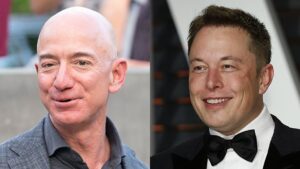Title: The Future of Wealth: Why Billionaires Could Face a Minimum Tax Proposal
In today’s world, the concentration of wealth among a few ultra-rich individuals has become a pressing global issue. As the rich continue to amass greater wealth, discussions around implementing a minimum tax for billionaires are gaining momentum. But what exactly does this mean for the ultra-rich like Elon Musk and Jeff Bezos?
According to Gabriel Zucman, a Professor of Economics, the wealth held by just 3,000 individuals worldwide has skyrocketed to $14.4 trillion, accounting for 13% of the global GDP. This alarming statistic highlights the growing disparity between the ultra-rich and the rest of society. Zucman also notes that these billionaires often pay significantly lower tax rates compared to the average worker, further exacerbating economic inequality.
The G20 is starting to take notice of this issue, with a recent meeting in Rio de Janeiro emphasizing the need for all taxpayers, especially the ultra-wealthy, to contribute their fair share in taxes. The push for a minimum tax on billionaires is gaining traction, with 70% of people supporting the idea of higher income tax rates for the wealthy.
While the 2% minimum tax proposal did not make it into the final text of the Rio declaration due to political disagreements, Zucman believes that there is no turning back. He points to past international tax negotiations that have successfully curbed tax avoidance by multinational corporations as a reason to be optimistic about the future of the minimum tax proposal.
The importance of this proposal lies in its potential to generate additional revenue to finance critical services like education, healthcare, and climate initiatives. By ensuring that the ultra-rich pay their fair share of taxes, governments can address societal issues and reduce economic inequality.
President Joe Biden has been a vocal supporter of the billionaires’ tax proposal in the U.S., advocating for a minimum tax rate of 25% for the wealthiest individuals. However, opposition from some of the richest individuals, like Jeff Bezos and Elon Musk, has sparked debate over the feasibility of such a tax.
Zucman points out that billionaires often pay minimal taxes by living off their wealth rather than traditional income. By borrowing against their assets instead of selling stock, these ultra-rich individuals can avoid hefty tax bills. Implementing a minimum tax on billionaires would ensure that all forms of wealth are subject to taxation, regardless of residency.
At Extreme Investor Network, we believe that staying informed about the evolving landscape of wealth and taxation is essential for all investors. As discussions around the minimum tax proposal continue to unfold, be sure to follow our blog for the latest insights and analysis on finance and investing. Join us as we explore the future of wealth and the implications of proposed tax reforms on the ultra-rich.

